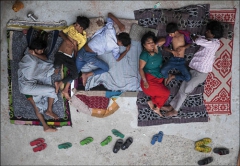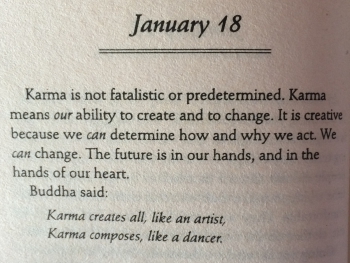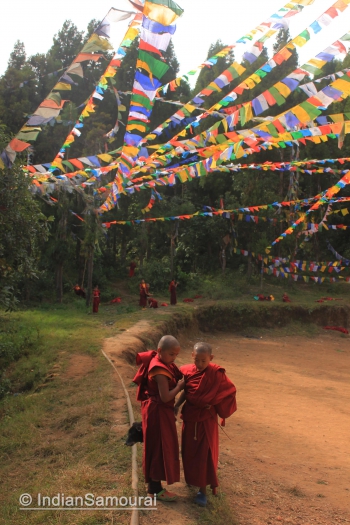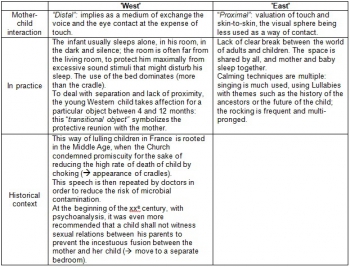11/23/2015
It’s my destiny! (Karma for dummies)
What is karma? Every action you do, like me writing at this very moment, has a consequence, an effect, in this life or the next. Everything is a matter of cycle. Basically if you do a good action with a good intention, you will sow positive fruits. However if you do a bad action with a bad intention, careful with the backlash! And there is no way to escape... It’s a bit like fatality: it’s inevitable and it looks like an occult force which would determine the events. Nevertheless it doesn’t make the individual less responsible: he is his own master, and everything depends on him, on his intentions and his choice... If your life is full of shit, too bad, there is no much you can do about it, you are carrying bad karma; however you can keep doing good things for the future effects! Just see what Sogyal Rinpoche writes in Glimpse by glimpse:
And to illustrate... One day I did something wrong. What I don't know but as a result, I got a cracker exploding right next to my ear and it was so deafening that I thought it would lose hearing. It was my first Diwali in Mumbai, in 2009. Following this unfortunate incident, I swore I would never spend another Diwali in this city, already noisy in a normal time, and which turns crazy during this festival of lights; they burst crackers (and not small ones, day and night). So this year I went to Sikkim. A very small State, in the North of India, Buddhist like I like it. With mountains, lakes and monasteries. Peaceful. Quiet. I was there, on top of a hill, in the backside of Rumtek monastery, next to the monks’ playground, when, while I was enjoying the view, a young monky... bursted a cracker just next to me, blowing my ear. Karma suffers no exception... I just have to live with it: I am meant to have my ears suffering during Diwali!
By the way, at the time of writing these lines, I hear a valse of crackers. Apparently they are celebrating basilic (Tulsi) - go figure - and preparing for the birthday of the guru of the Sikhs. It's like another Diwali, which I have never experienced. If this is not the proof of karma what would be? One cracker for each slap I gave my younger brother, I am not close to the end of it!!
The prankster monks of Rumtek monastery, Sikkim
08:00 Posted in Incredible India!, My stories in India, Travelling (in India!) | Permalink | Comments (0) | Tags: india, karma, buddhism, religion, destiny, fatality, diwali, noise, crackers, sikkim, rumtek monastery, monk | ![]() Facebook | |
Facebook | |
10/12/2015
Sleep baby sleep... (Sleeping in India and in France)
A friend (Indian) came home unexpectedly on Saturday night at 9 PM. When he ‘complained’ about Baby Samurai not being available for play, I explained that he had been sleeping for an hour already. To which he answered: “Are you German or what, that he needs to have a schedule?” That says it all…
Sleep is one of the largest cultural differences between India and France, according to me.  For example, an Indian can easily talk to you while you are asleep, or clean your room, or even bring you a chai. And nobody would think of closing the door of the bedroom when starting a movie full volume in the room next door. The few times I allowed myself to sleep late, like until 11, my favorite Indian was all over the place, and came and disturbed me several times...
For example, an Indian can easily talk to you while you are asleep, or clean your room, or even bring you a chai. And nobody would think of closing the door of the bedroom when starting a movie full volume in the room next door. The few times I allowed myself to sleep late, like until 11, my favorite Indian was all over the place, and came and disturbed me several times...
It must be linked to the living conditions: as many people live in very small spaces, no one can afford the luxury of a beautiful uninterrupted nap, or in silence (to be fair, it is better they learn from an early age to sleep through the noise in India, it is quite a matter of survival). In India people sleep because they have to, they do not indulge in the comfort of resting. However it is a little less true regarding food, yet another physiological need.
The same goes with babies (1). They follow the rhythm of the household. Even worse: If parents work a lot, it is not uncommon that a baby stays awake till past midnight in order to spend some time playing with his father.
In India, the child sleeps with his mother. And therefore, theoretically, with his father. Unless the latter doesn’t want to be woken up (by the baby’s cries or kicks), in which case he will go sleep wherever he can (on the floor, on a mattress, in another bed or on the couch). I know a lot of such cases. About the couple intimacy? Well, even before there is a baby, it is already quite an unusual concept (once again probably because of the ‘sardines’ way of life and also of the arranged marriage). And even if it was, the baby comes first. And he must sleep with his mother, to be able to suckle ad libitum and to ‘create bonds of love’. In such a context, the baby doesn't need to learn to fall asleep by himself nor to go back to sleep on his own; and they don’t let him cry more than two seconds. The baby is King in India, at least the first two-three years (after that it becomes less funny, with a strong reality check for what is coming ahead).
That mothers end up exhausted from continuously waking up from kicks or a greedy suckling mouth, nobody cares (at least after the first 3 months where they are well looked after by their mothers, so that they recover well from the physical hardship that giving birth is).
You have guessed, I was one of these wron-out mothers, since Baby Samurai had decided that sleeping at night was good for fools, the day he turned 4 months. well he was sleeping, but would wake up every two hours (at best). In addition we traveled quite a lot, and he often slept in our bed. At 5 months I did try the Tracey Hogg method to teach him to fall asleep by himself, but I was already too weak from sleep deprivation to withstand an hour of crying and I decided that 1. He was too small, 2. Westerners were a little too harsh in the way they (we) educate the babies, 3. The French are quite cold-hearted to leave a newborn alone in his bed in his room the first night itself.
And there I became sleep deprived, crazed. Not depressed, but a real zombie. My goal every day was to pull the wool over my colleagues’ eyes (and master the technique of sleeping with eyes open). I must say that in addition to micro-nights, I had to deal with breastfeeding. And breastfeeding is good, but it is not always easy: it takes of lot energy, when he feeds, and even more so when you have to express milk. I had therefore abandoned the idea that baby Samurai (and I at the same time) would one day sleep an entire night, at least not before he would leave home...
And then, one evening, a friend of mine, a French girl married to an Indian man, sent me a document to “Sleep train babies" (SleepSenseTraining (website) that she intended to try.) I explained to her that personally I had given up and I expected things to settle by themselves. But then, out of curiosity and because I had nothing else to do and I had my phone in hand, I opened the book. 45 minutes later, Baby Samurai woke up and I decided to test this technique illico presto. Just like somebody drowning clings on to a lifeline. The last chance! After crying for 45 minutes, he was sleeping soundly. And in a week’s time (with ups and downs) he was sleeping almost all through the night, more than 10 hours. I would have been told it was possible, I would have not believed it!
This being said, I did things my way. And some may argue that I am taking the best of each culture, but really, I'm just following my instincts. So we follow a bedtime routine which includes a massage, he goes to bed at 8 PM and he sleeps in his crib. On the other hand he sleeps in our room and I don't insist he falls asleep without anybody in the room; I will continue to take him in my arms to calm him down if he needs and I am a little flexible regarding the naps. I was also comforted in my approach by the little I have read about Hélène Stork’s work about ‘compared practices of mothering in the West and in other countries, including South India’ and I just ordered her book (2).
In any case, Baby Samurai sleeps and I feel alive again – in fact I'm almost tired of sleeping too much but I shall not complain shall I??
(1) Summary of the differences in mothering:
Source:https://www.Cairn.info/Revue-spirale-2005-2-page-151.htm
(2) Hélène Stork, Indian childhoods. Study and comparison of cross-cultural psychology of the young child, Paris, Paidós / Centurion, 1986
Providing medical and psychological consultation in Paris suburbs, Hélène Stork found many psychological disorders in young children. Following her strong intuition that these difficulties were representative, among others, of the malaise of an entire society, she compared the practices of mothering in the West with those of other countries, including South India (Tamil Nadu), where she stayed at length, on several occasions. Like the Ethnologist, she led extensive clinical research on the field, along with studies of ancient Sanskrit texts underlying the Indian techniques of infant care. This book, after defining cross-cultural psychology (history, methods, goals), describes with great precision (thanks, in particular, to the filmic investigation) gestures and postures of mothering in South India, bringing a rich contribution to the study of the psychic life of babies during the first six months. At the end of his work, Hélène Stork formulates a question for the West: “Does the social organization of the family allows women (parents) to practice a mothering helping in the sensory-motor development and good mental health of the child?”
08:00 Posted in Expatriation (in India and in other countries), Incredible India!, Little Samourai, My stories in India | Permalink | Comments (0) | Tags: india, sleep, hélène stork, education, baby sleep, sleep training, tracey hogg | ![]() Facebook | |
Facebook | |
09/28/2015
Ganapati and the elephantastic noise
It has been 9 years that Ganesh festival was impressing my eyes (see previous notes); now it mostly impresses my ears!
Below is the typical musical scene I face when going home. And also once I am home, sound-proofing not being a forte of Indian houses.
Every year millions of Ganesh idols, the God with an elephant head, are put into water, taking off with him the sins of the poor mortals. The latter spending fortunes(yes yes, even poor people invest a lot. Especially the poor in fact) to have the best looking (or most impressive) Ganesh of the neighbourhood. And to let everybody know about it - the most effective way being using huge speakers and playing techno music full fledge.
On top of aggressing ears, the festival makes me feel bad, personally. It is so bad for the environment, these tons of Plaster of Paris (which does not dissolve at all even after 48 hours, unlike clay (source)) and heavily toxic paints thrown in the sea every year…
But let us be positive! There are some good initiatives bringing hope. Immersing the idols in tanks instead of rivers. The chocolate statue drown in milk and distributed to poor children. The Ganesh made out of fish food with natural paints made out of spices. So of course it creates metaphysical problems, and the religious experts have been debatting about the future of the immersed Ganapatis. Ending up in a landfill? In the digestive system of fishes? Or in the tummy of poor kids? Is it religiously correct? I have obviously no theological expertise but ending up as trash rejected by the sea is not the sexiest thing either!
Sources:http://indianexpress.com/article/cities/pune/pune-all-fiv...; http://www.sakaaltimes.com/NewsDetails.aspx?NewsId=569081... ; http://www.storypick.com/ganesh-idols/; http://www.dnaindia.com/mumbai/report-chocolate-ganesh-creates-a-buzz-on-social-media-2126669
14:21 Posted in Funny things about India in photos, Funny things about India in videos, My stories in India | Permalink | Comments (0) | Tags: india, mumbai, religion, festival, ganesh, ganapati, ganesh chaturthi, environment, idols | ![]() Facebook | |
Facebook | |

















